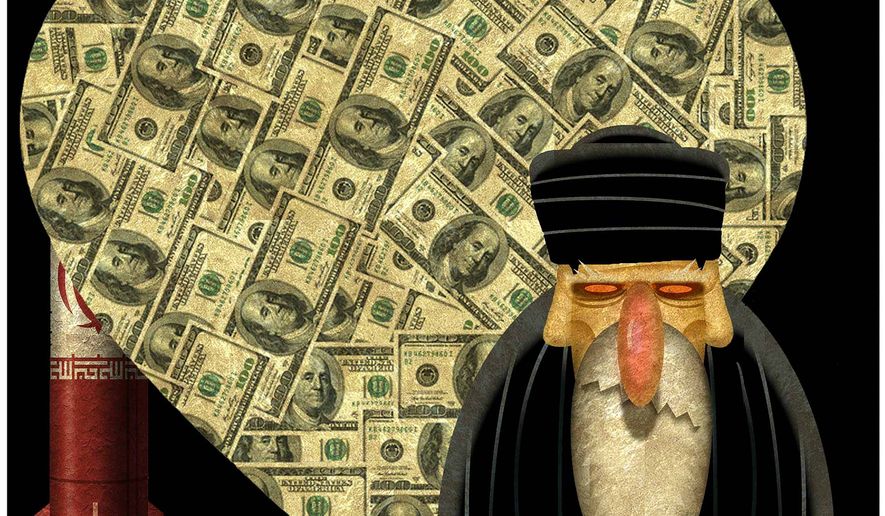OPINION:
President Obama’s critics charge that he’s never developed a strategy to defeat terrorism, the weapon of choice for those waging what they call a global jihad. The Atlantic’s Jeffrey Goldberg, the journalist whose ear Mr. Obama most likes to bend, says that’s wrong — that the president does have a strategy. “He is, after all, killing jihadists at a frenetic pace.”
First, it’s really not clear that Mr. Obama is engaged in anything more than a less-than-successful holding action against the Islamic State, al Qaeda, the Taliban and similar adversaries. Second, killing — at whatever pace — is a tactic, not a strategy. Third and perhaps most important: There are Sunni jihadists and Shia jihadists and both utilize terrorism. What is Mr. Obama doing about the Shia jihadists? He’s rewarding and enriching them.
To be fair, that may be a strategy, or at least part of one. It’s based on a set of assumptions, all of which I’d call dubious, e.g., that the Islamic Republic of Iran has “legitimate grievances” that deserve to be addressed; that Iran’s theocrats, like us, seek compromise; that they, like us, favor “conflict resolution” through diplomacy and regard violence as a last resort.
Pursuant to this thinking, Mr. Obama concluded — without congressional consent — what he considers a good deal with Tehran. The Joint Comprehensive Plan of Action (JCPOA) obligates Iran’s rulers to delay a nuclear weapons program they do not acknowledge exists. In exchange, the United States and its European allies have agreed to release more than $100 billion in frozen assets and lift those sanctions imposed in response to Iran’s illicit nuclear activities.
Other sanctions — such as those imposed because Iran, according to the U.S. government, continues to sponsor terrorism, develop ballistic missiles capable of carrying nuclear warheads, and conduct illicit financial activities — were meant to stay in place.
Mr. Obama and his deputies were adamant about this when they were attempting to persuade Congress to go along with the JCPOA. There was one specific and enormous concession that Secretary of the Treasury Jacob Lew specifically assured Congress would not be granted: access to dollar transactions and the American financial system. “Iranian banks will not be able to clear U.S. dollars through New York, hold correspondent account relationships with U.S. financial institutions, or enter into financing arrangements with U.S. banks,” he told the Senate Foreign Relations Committee. “Iran, in other words, will continue to be denied access to the world’s largest financial and commercial market.”
In recent days, however, Mark Dubowitz and Jonathan Schanzer, colleagues at the Foundation for Defense of Democracies, have assembled evidence leading to the conclusion that Mr. Obama has indeed been planning to grant this concession.
He has asked Iran’s rulers for nothing in return. On the contrary, since the conclusion of the JCPOA, they have been “testing” ballistic missiles in violation of U.N. Security Council resolutions, aiding and abetting the slaughter in Syria, supporting Houthi rebels in Yemen, and threatening Israelis with genocide. They have seized and humiliated American sailors. Recently, for the first time ever, the U.S. Justice Department charged state-sponsored individuals — seven Iranians — with hacking to disrupt critical American infrastructure.
Supreme Leader Ali Khamenei remains as anti-American and bellicose as ever. “Those who say the future is in negotiations, not in missiles, are either ignorant or traitors,” he said last week. So why give him a prize?
It could be because Mr. Obama sees the Iran deal as an important part of his legacy. It could be because he fears that Ayatollah Khamenei will walk away from the deal as soon as the stream of benefits stops flowing. It could be because Mr. Obama wants to bolster Iranian President Hassan Rouhani, whom he regards — incorrectly, I’d argue — as a moderate. It could be all of the above.
Whatever the explanation, many members of Congress, on both sides of the aisle, are furious over having been deceived. “I do not support granting Iran any new relief without a corresponding concession,” Steny Hoyer, the No. 2 Democrat in the House, said in a statement.
Rep. Mike Pompeo, a Kansas Republican who serves on the House Permanent Select Committee on Intelligence, said either Congress has been “intentionally misled” or “the Obama administration and the Iranians are changing the terms of the nuclear deal months after it was finalized. Either scenario is unacceptable.”
Responding to this pushback, Mr. Obama said it is “not necessary that we take the approach of [Iranians] going through dollar-denominated transactions. It is possible for them to work through European financial institutions as well.” Translated into English, this appears to endorse some kind of workaround involving offshore dollar clearing, a less direct way of giving Iran’s rulers what they want, thereby allowing, as Mr. Obama put it, “deal flows to begin.”
If you’re puzzled as to why he’d be eager to facilitate Iran’s “deal flows,” consider this possibility: He believes in the power of commerce to transform the regime, to convert its theocrats into tycoons more eager to make money than war, more focused on building nest eggs than spreading the Islamic Revolution.
In other words, that could be Mr. Obama’s strategy to combat Shia jihadism-terrorism. Its most obvious flaw: Iran’s theocrats are already filthy rich — and they’ve never been overly concerned about the deprivations suffered by the average Iranian. “This revolution was not about the price of watermelons,” Ayatollah Ruhollah Khomeini, Iran’s first “supreme leader,” famously stated. Not a shred of evidence suggests that his heirs see things differently.
• Clifford D. May is president of the Foundation for Defense of Democracies and a columnist for The Washington Times.




Please read our comment policy before commenting.